Being John Lewis
John Lewis is a department store chain in the UK. No one cares who John Lewis might be any more than they care about Marks, Spencer, Lord, Taylor, or Macy. But when people have complaints, they start caring. And that's when they take to Twitter, tweeting at @johnlewis, giving the company an earful. Only, @johnlewis isn't the British department store. It's the Twitter profile of a middle aged dad in the United States.
His bio states he's a "computer science educator, father of four, social liberal, atheist, and not a retail store." Not that it stops thousands of people from reaching out to him with department store-related issues.


Generally, this isn't remarkable: plenty of people share the same name as a famous entity. There's George Papadopoulos, a CPA regularly mistaken for Trump's Foreign Policy Advisor, and Steve Bannon, a Scot with "nothing to do with US politics or running the White House etc." There's Mike Pence, a software engineer, Michael Cohen, a sports journalist, and Emma Gonzalez who did "Twitter Name Twin Group Therapy" on The Daily Show, a satire segment that ended with the therapeutic mantra, "I am more than my name. I will be strong and not go into my DMs."
To be mistaken for someone else on Twitter, you don't even have to share the same name. Brad Kavanagh, an English singer-songwriter, was on the wrong end of Twitter abuse when Brett Kavanaugh was confirmed for US Supreme Court Justice. The Emmy award-winning English writer Ian Martin is sometimes mistaken for conservative pundit Iain Martin. Though the "one i" Ian is a well-known comedy writer, he only proves that being the more famous of the two, and being a comedy writer, doesn't mean you have the grace and wit to handle it well.

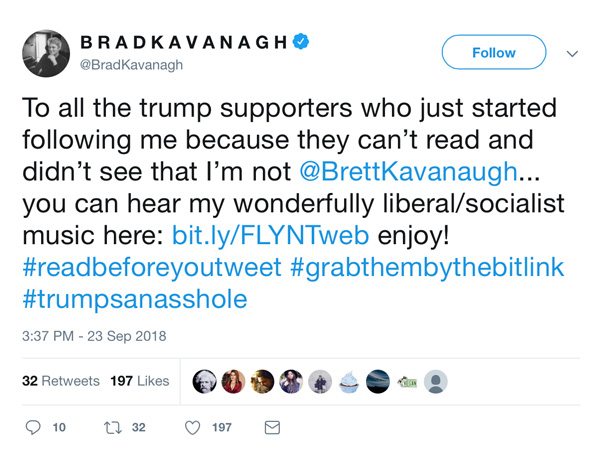
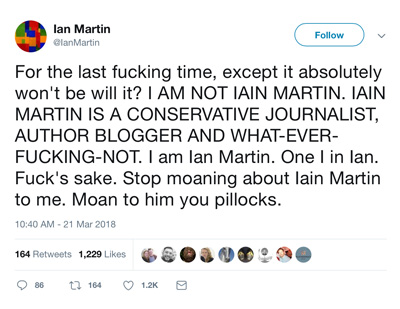
As we see, it's not the mistake that's noteworthy, it's the way it's handled. And John Lewis handles it. Ever helpful, his replies steer pissed-off John Lewis customers in the right direction, usually with a sardonic one-liner just on the nice side of glib.
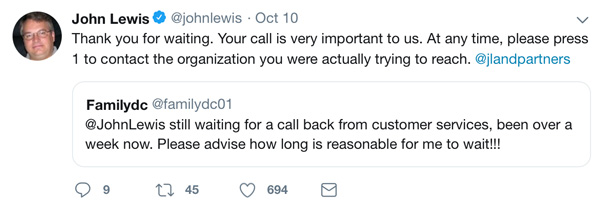
This level of diplomacy and humor has made Lewis an excellent ersatz customer service representative. As thanks, John Lewis the store has taken to sending him gift baskets: a pillow embroidered with "not the retail store," and recently, some Elton John tickets and a tin of sweets. Not bad for a free gift, though it does beg some questions. What is it exactly that John Lewis the man is doing for John Lewis the retailer? Is it free labor? Free marketing? It's all just a joke, but who is laughing?
The situation he's in is strange, but all too contemporary. By sheer dint of his name, Lewis must contend with a Brobdingnagian barrage of tweets if he is to use Twitter at all. Most people in that situation would have just quit Twitter, or at least changed their handle. Plenty of John Lewises have avoided this problem, like the Georgia Congressman @repjohnlewis, and the MMA champ @JohnLewisMMA. But by happenstance, the man who picked up the @johnlewis chose to deal with the barrage head on. He took on the role of guerrilla service rep, working thanklessly in the field, liaising between angry British consumers and a faceless company. In fact, he gave his Twitter persona over to it completely. Aside from the occasional anti-Trump tweet, John Lewis is a consummate professional. The rest of his tweets are wholly dedicated to John Lewis retail customers.
Obviously, he does it because he enjoys it. The jouissance is evident.
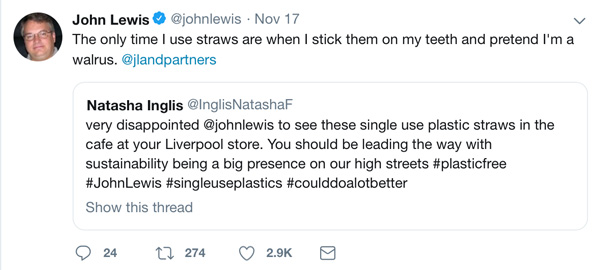
For a long time, though, the only people in on the joke were the pissed-off customers he exchanged tweets with—people who were in no mood for comic relief. So we can think of this more like a private joke: John Lewis having a laugh by himself. It only became a thing because Lewis's wisecracks were so retweetable. They're personal, yet public-facing. They're genuine and funny. At the risk of sounding like a commercial, they're Twitter at its best.
This is something Twitter is well aware of. In November, Twitter ran a commercial in the UK specifically about John Lewis the man. It depicts him behind his laptop, tweeting merrily away, and ends with the words, "This Christmas. Join the conversation. Even if it's by mistake." The clip plays on more than just the shared namesake: John Lewis the retailer is well known for their award winning Christmas commercials, and the Twitter version plays on this with little details that riff off the retailer's classic ads from previous years. If the man's fame wasn't assured by that stunt, Twitter did one better in late December and granted him "verified" status, adding a little blue badge to his name. Ironically, this will probably only add to the confusion, as consumers often look for verified profiles when trying to locate an official presence on Twitter. But it's worth it for the social media company: the adventitious, homespun John Lewis is to Twitter what YouTube stars are to YouTube.
For all that, Twitter was a bit of a latecomer. John Lewis had long since acquired a kind of cult status. There's something exquisitely delightful about a mild mannered computer scientist who claps back at petty shoppers. When he switched to using quote tweets in late 2016, he raised it to a form of high art.
He even makes jokes about the jokes he makes.
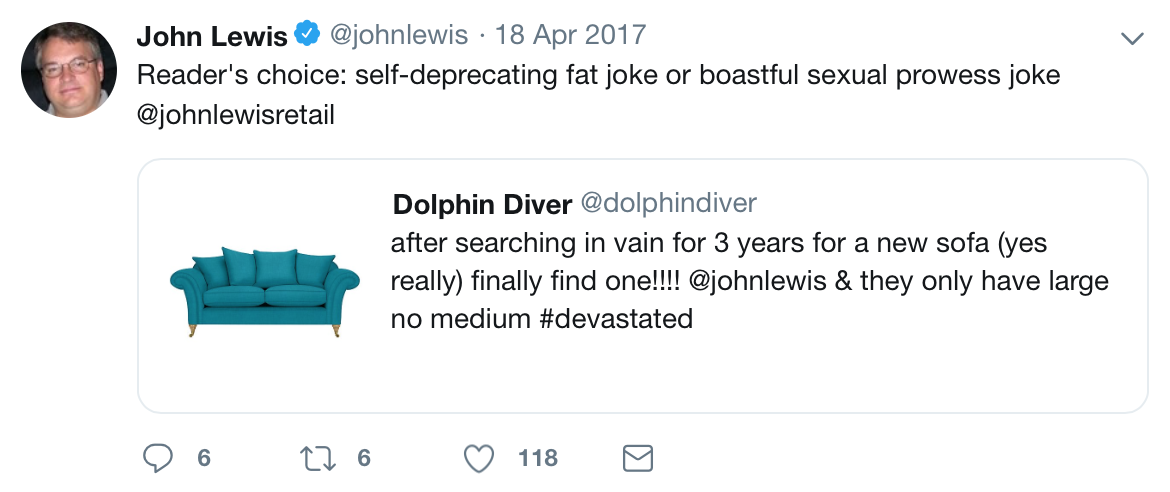
If John Lewis is a hero for you, too, check out the one-man play about him that showed this autumn at the Edinburgh Fringe Festival, and the UK commercial Twitter came out with in November. And Tweet at him. Especially if it has nothing to do with the department store.
